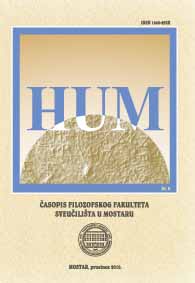„SVETO“ U FILOZOFIJI RUDOLFA OTTA
“HOLY” IN RUDOLF OTTO’S PHILOSOPHY
Author(s): Ivan ŠevoSubject(s): Philosophy
Published by: Filozofski fakultet Sveučilišta u Mostaru
Keywords: God; mystic; religion; experience; rational; irrational; numinous; mysterium numinosum; mysterium tremendum; mysterium fascinans; holy.
Summary/Abstract: The article is trying to condense a term “holy” in Rudolf Otto’s philosophy emphasizing that Otto firstly explains the basic term of numinous which can be found in all religions, especially Biblical ones, revealing two aspects of numinous secret (“mysterium numinosum”): the scaring one (“tremendum”) and the fascinating one (“fascinans”). What is mysterious is not only incomprehensible because our mind in relation to mysterious has certain insuperable limitations, but in that case we are confronted with something completely different, what is in most cases incommensurable to our intellectual ability. Regarding “mysterium numinosum” the author also observes that dichotomous aspect has been running through entire religion history. Although divine can seem horrifying to a man, it has its attracting, admiring face. Analyzing the term “holy” (lat. “sanctus”), Otto suggests that this term is translated as “extraordinary”, “transcendent”. The term “holy” is very close to the term “sublime” (“erhaben”, “augustus”). Therefore the term holy “sanctus” symbolizes distinctiveness of numinous which has subjective value of making happy, while the term sublime, magnificent (“augustus”) symbolizes objective value of numinous, value which can be found in itself. The author also defines the term “irrational”, which is considered by Otto as an attribute of divinity which cannot be understood “clare et distincte” by our notional instruments. It does not evade from our feeling than from our rational thinking.
Journal: Hum
- Issue Year: 2010
- Issue No: 6
- Page Range: 286-301
- Page Count: 16
- Language: Croatian

